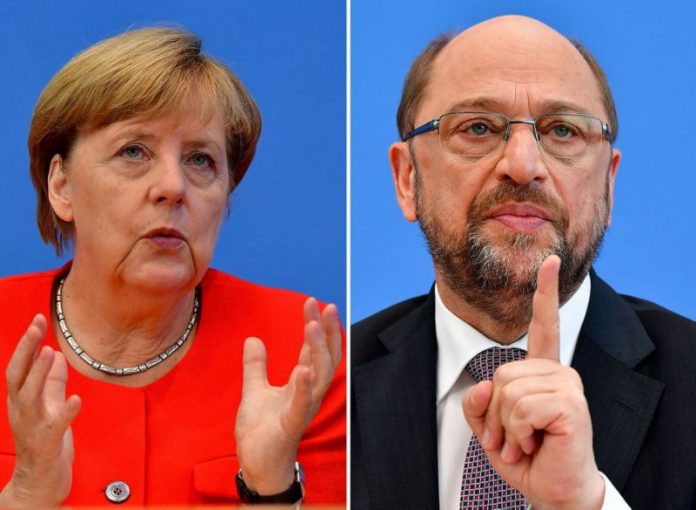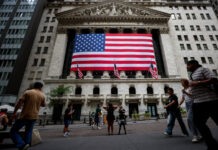
The German election less than two weeks away, with Chancellor Angela Merkel defending her position against Martin Schulz for a fourth term in power.
Polls currently show that Merkel’s Christian Democratic Union (CDU) party – with its Bavarian sister party, the Christian Social Union (CSU) – will be the largest party after the Bundestag election on 24 September, but they will fall short of a majority.
This is common in Germany, and so the resulting parliament is in part determined by how the smaller parties perform, and which coalition possibilities will be born.
How does the German voting system work?
Each person casts two votes in the Bundestag election, to allocate a total of 598 seats. Half of these are to elect a local MP by constituency, in a first-past-the-post fashion.
The remaining 299 votes are elected via party lists, allocated near-proportionately to the party vote share in each of Germany’s 16 federal states.
To be included in this seat allocation process, a party must achieve five per cent of the national vote.
This second round of seat allocation also means that the total number of MPs can be higher, with politicians elected in “overhang seats” in order to balance the state- and constituency-level votes. The most recent parliament had 32 overhang seats, taking the total up to 631 MPs.
This allows voters to represent their interests locally through their chosen representative, as well as nationally in the party they feel will be strongest in the Bundestag.
In the end, the seat share for each party ends up very similar to their vote share – unlike the system used in the UK’s parliamentary elections.
So who will win the German election?
Merkel’s CDU is looking most likely to win the most seats in the Bundestag – for the fourth election in a row.
The SPD, led by former President of the European Parliament Martin Schulz, is in second place in the polls – securing around a quarter of the vote.
The AfD – the far-right Alternative for Germany party – had enjoyed a slight rise in the polls in 2016 but have since collapsed into in-fighting and unpopularity.
In reality, the CDU will have to seek a coalition agreement with the SPD or one of the other minor parties to form a government.
Potential coalitions
The centre-left Social Democratic Party (SPD) has been in coalition with centre-right CDU in this current government, as well as in Merkel’s first term. These two parties are Germany’s biggest, leading to a union dubbed the “Grand Coalition”.
The polls are currently suggesting that Germans are content with their current government, which means a Grand Coalition could happen for a third time in just four elections.
Another option is a Black-Yellow coalition, consisting of Merkel’s CDU party propped up by the smaller Free Democratic Party (FDP). This would take Merkel over the target needed for a majority, and was the option the party opted for in 2009-2013.
The only situation that poses a risk to Merkel’s leadership is a left-wing “Red-Red-Green” coalition, led by the SPD’s Martin Schulz. For this, he would have to gather enough seats together alongside the Linke (Left) and Grüne (Greens) parties.
What do the parties stand for?
The main parties standing in the election are as follows:
- Christian Democrats (CDU): The leading party in Germany, headed by Angela Merkel. The centre-right group – made up of the Christian Democratic Party (CDU) and the Bavarian Christian Social Union (CSU) – they have employment, tax cuts and ongoing public investment at the forefront of their manifesto.
- Social Democrats (SPD): Led by Martin Schulz, the centre-left are vying to make another Grand Coalition to remain in government. The party polled well following the election of their new leader, but then suffered once again in regional polls. The SPD is a traditionally working class party, pledging investment in education and infrastructure, funded by higher taxes for the rich.
- Left (Linke): Led by Sahra Wagenknecht and loosely descended from the East German communists. This small party, often used as a protest vote, is campaigning for a rise in national minimum wage, a rejection of military missions abroad and the dissolution of NATO.
- Green (Grüne): Led by co-chairs Katrin Göring-Eckardt and Cem Özdemir, this party could be the coalition kingmakers. They rely on educated, urban citizens, focusing on the environment, taxes and social policies.
- Free Democratic Party (FDP): Led by Christian Lindner, the party was Merkel’s junior coalition party in her second term. It failed to reach five per cent of the vote to allow another coalition in 2013. The party campaigns for tax cuts and to remain in financial markets – particularly within the EU.
- Alternative for Germany (AfD): A right-wing populist party lead by Alice Weidel and Alexander Gauland. The party’s hardline anti-EU, anti-immigration views have attracted voters from almost all of the other parties, especially among lower income households.
What are the betting odds for the German Bundestag election?
Political pollsters have taken a beating recently after failing to predict a British Hung Parliament in 2017, a Leave vote last summer and a Donald Trump victory in November.
For those who have lost faith in polling, there is another way of predicting electoral outcomes: ask people who are prepared to put their money where their mouth is. Many now believe that political betting markets can better predict elections, relying on the wisdom of a crowd of punters to sort and weigh all the probabilities.
Coral’s latest odds for the election have Mrs Merkel as most likely to continue as Chancellor after the election. The latest odds for the party to emerge with the most seats are:
- CDU/ CSU – 1/50
- SPD – 16/1
- AfD – 100/1
- Die Linke – 100/1
- Greens – 100/1
- FDP – 100/1














Reading your daily articles really makes us more knowledgeable
Good article